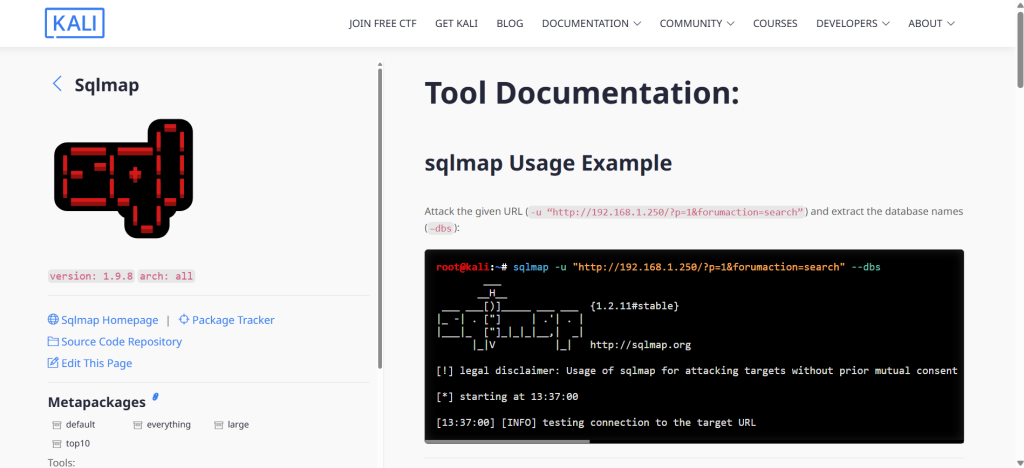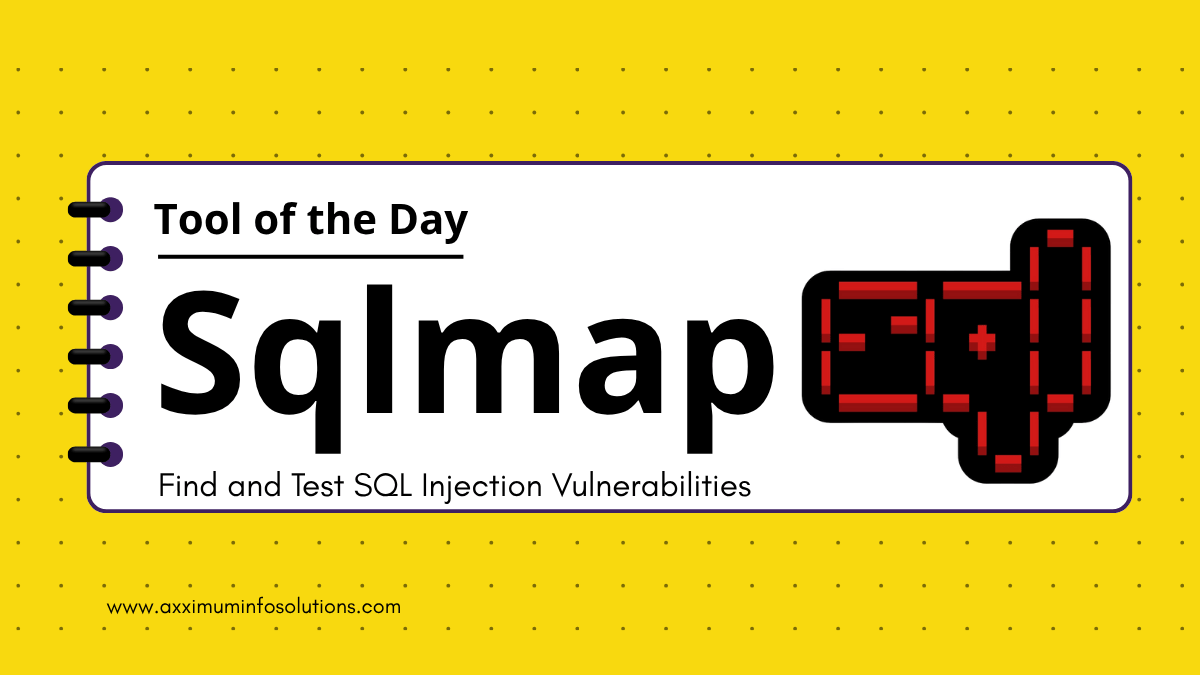Tool of the Day – Sqlmap: Find and Test SQL Injection Vulnerabilities
Introduction — Why “Hacking Tools of the Day” Matters
When you run a modern web application, one of your biggest risks is the humble SQL injection. That’s why in our Hacking Tools of the Day Sqlmap series we highlight tools that security pros — and responsible learners — should know. Today’s spotlight is on sqlmap, an industry-standard open-source tool that automates detection and exploitation of SQL injection flaws. Whether you’re a penetration tester, security engineer, or developer aiming to secure your stack, sqlmap should be in your toolkit — used ethically and legally.
Table of Contents
- Introduction — Why “Hacking Tools of the Day” Matters
- What Is sqlmap?
- Why sqlmap Appears in “Hacking Tools of the Day”
- How sqlmap Works — A Practical Overview
- Step-by-Step: Using sqlmap Safely and Effectively
- Interpreting sqlmap Results & Prioritizing Fixes
- Mitigation Strategies: Fix SQL Injection Vulnerabilities
- Common Mistakes When Using sqlmap
- Conclusion
What Is sqlmap?
sqlmap is an automated penetration testing tool that detects and exploits SQL injection vulnerabilities in web applications. It abstracts low-level injection details into user-friendly commands, allowing testers to quickly validate vulnerabilities and gather database-level intelligence.
Key Features at a Glance
- Automated detection of multiple SQL injection types (boolean, time-based, error-based, etc.).
- Database fingerprinting (MySQL, PostgreSQL, MSSQL, Oracle, SQLite, and more).
- Full enumeration: databases, tables, columns, and data dumping.
- Support for HTTP headers, cookies, authentication, and proxy chaining.
- Integration options with scripting and custom payloads.
Why sqlmap Appears in “Hacking Tools of the Day”
sqlmap earns a spot in Hacking Tools of the Day because it drastically reduces the manual effort needed to test SQL injection vulnerabilities. It’s prolific in bug bounties and enterprise assessments because it’s reliable, extensible, and regularly updated by the community — making it a “go-to” for quick validation and proof-of-concept generation.
How sqlmap Works — A Practical Overview
At its core, sqlmap automates three phases:
- Targeting & probing — identifies injectable parameters (URL parameters, POST bodies, headers, cookies).
- Fingerprinting — determines the DBMS, version, and features available.
- Exploitation & enumeration — extracts schema info or data, depending on authorization and scope.
Detection vs Exploitation
- Detection: sqlmap sends crafted requests to see if input modifies SQL behavior (responses, timing, or errors).
- Exploitation: once confirmed, it uses payloads to enumerate or extract data. Note: exploitation should only be performed on systems you own or have explicit permission to test.
Common Payloads & Techniques
- Boolean-based blind injections (true/false logic).
- Time-based blind injections (delays to infer data).
- Error-based injections (leveraging DB error messages).
- UNION-based data retrieval (combining malicious queries with legitimate ones).
Step-by-Step: Using sqlmap Safely and Effectively

Preparation: Scoping, Authorization & Legal Considerations
Before you run sqlmap:
- Obtain explicit, written permission for the target (scope, allowed tests, time windows).
- Use staging environments if possible.
- Inform stakeholders (DevOps, incident response) to avoid misinterpreted alerts.
- Keep logs and proof-of-testing documentation.
Security testing without permission is illegal and unethical.
Basic sqlmap Commands
Here are minimal commands to safely test a parameter:
- Test a GET parameter:
sqlmap -u "https://example.com/page.php?id=1" --batch --level=2 --risk=1- Test with a cookie and specific parameter:
sqlmap -u "https://example.com/search" --data="q=test" --cookie="PHPSESSID=abc123" -p q --batch- Enumerate DBMS and list databases:
sqlmap -u "https://example.com/page.php?id=1" -p id --dbs --batchNotes: --batch runs non-interactively; -p specifies parameter; --level/--risk tune depth of tests.
Advanced Usage: Enumeration & Post-Exploitation
- Dump a specific table:
sqlmap -u "https://example.com/page.php?id=1" -p id -D mydb -T users --dump- Use a proxy for debugging (e.g., Burp):
sqlmap -u "https://example.com/page.php?id=1" --proxy="http://127.0.0.1:8080"- Brute-force password hashes, test file write/read (only in-scope and allowed).
Interpreting sqlmap Results & Prioritizing Fixes
When sqlmap reports a vulnerability, it typically provides:
- Vulnerable parameter(s) and injection type.
- DBMS and version info.
- Proof-of-concept payloads and response evidence.
Prioritize by:
- Input reachability (auth vs public).
- Sensitive data exposure (PII, credentials).
- Exploitability (remote DB access, file read/write).
Create a remediation ticket with reproduction steps, proof, and suggested fixes.
Mitigation Strategies: Fix SQL Injection Vulnerabilities
Quick Fixes for Dev Teams
- Use prepared statements / parameterized queries (never concatenate user input).
- Apply strong input validation and output encoding.
- Remove excessive DB permissions for application accounts.
- Implement Web Application Firewalls (WAF) as a temporary mitigation.
Long-term Secure Practices
- Adopt secure coding standards and code reviews focused on injection risks.
- Use ORM layers that properly parameterize queries.
- Regular dependency and schema audits.
- Automated CI/CD scanning: run sqlmap-like checks in controlled, pre-prod environments.
- Continuous training for dev teams on secure database usage.
Common Mistakes When Using sqlmap
- Running aggressive scans on production without notice.
- Misinterpreting false positives — always confirm manually.
- Ignoring context (params that look injectable but are sanitized upstream).
- Dumping sensitive data without containment and stakeholder consent.
Conclusion
sqlmap is a powerful, essential entry in any Hacking Tools of the Day toolkit — when used responsibly. It speeds up vulnerability discovery, provides clear evidence for remediation, and helps security teams reduce exposure to SQL injection risks.
Ready to secure your apps?
If you want Axximum Infosolutions to run an authorized security assessment, or to train your team on responsible use of sqlmap and other tools in our Hacking Tools of the Day series, contact us today. Our experts deliver ethical, thorough testing and developer-friendly remediation guidance.







